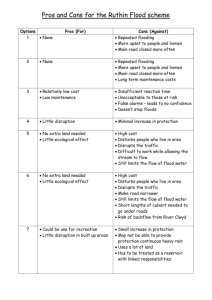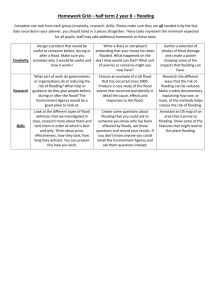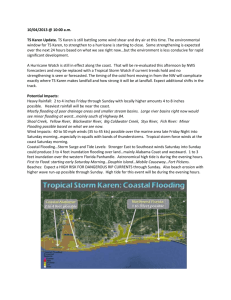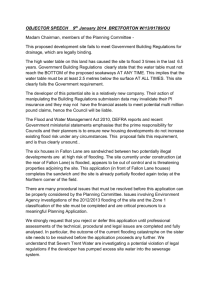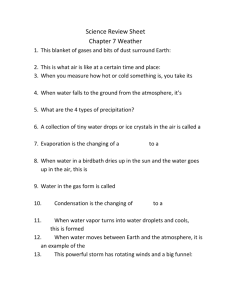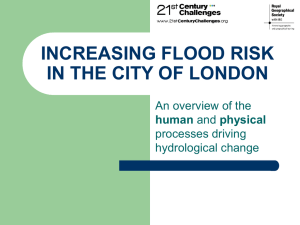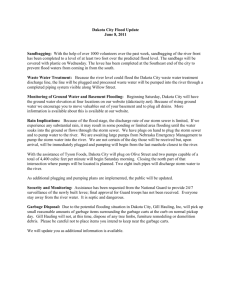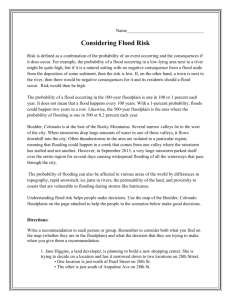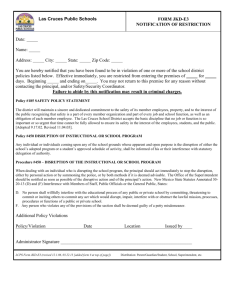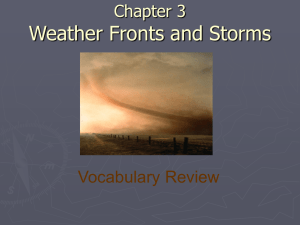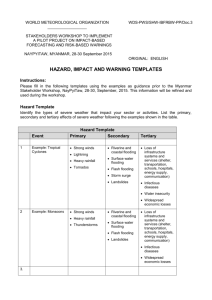US/UK winter storms
advertisement
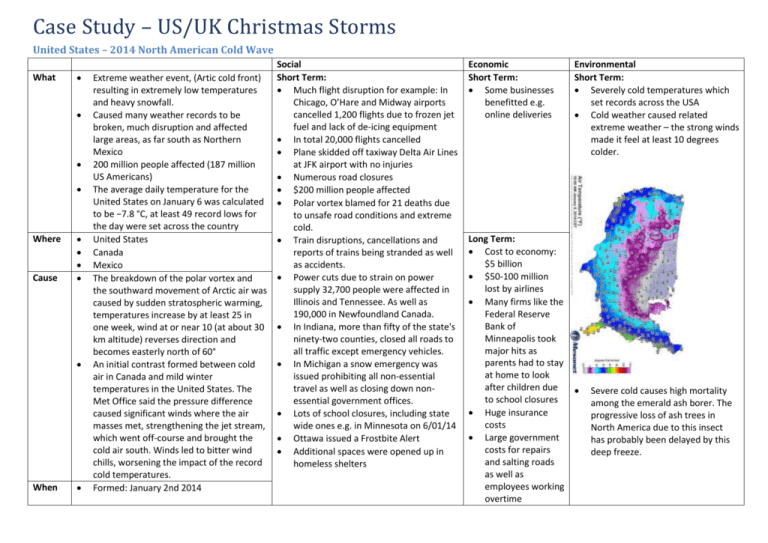
Case Study – US/UK Christmas Storms United States – 2014 North American Cold Wave What Where Cause When Social Short Term: Extreme weather event, (Artic cold front) resulting in extremely low temperatures Much flight disruption for example: In and heavy snowfall. Chicago, O’Hare and Midway airports cancelled 1,200 flights due to frozen jet Caused many weather records to be fuel and lack of de-icing equipment broken, much disruption and affected large areas, as far south as Northern In total 20,000 flights cancelled Mexico Plane skidded off taxiway Delta Air Lines at JFK airport with no injuries 200 million people affected (187 million US Americans) Numerous road closures The average daily temperature for the $200 million people affected United States on January 6 was calculated Polar vortex blamed for 21 deaths due to be −7.8 °C, at least 49 record lows for to unsafe road conditions and extreme the day were set across the country cold. United States Train disruptions, cancellations and Canada reports of trains being stranded as well as accidents. Mexico Power cuts due to strain on power The breakdown of the polar vortex and supply 32,700 people were affected in the southward movement of Arctic air was Illinois and Tennessee. As well as caused by sudden stratospheric warming, 190,000 in Newfoundland Canada. temperatures increase by at least 25 in one week, wind at or near 10 (at about 30 In Indiana, more than fifty of the state's ninety-two counties, closed all roads to km altitude) reverses direction and all traffic except emergency vehicles. becomes easterly north of 60° In Michigan a snow emergency was An initial contrast formed between cold issued prohibiting all non-essential air in Canada and mild winter travel as well as closing down nontemperatures in the United States. The essential government offices. Met Office said the pressure difference caused significant winds where the air Lots of school closures, including state masses met, strengthening the jet stream, wide ones e.g. in Minnesota on 6/01/14 which went off-course and brought the Ottawa issued a Frostbite Alert cold air south. Winds led to bitter wind Additional spaces were opened up in chills, worsening the impact of the record homeless shelters cold temperatures. Formed: January 2nd 2014 Economic Short Term: Some businesses benefitted e.g. online deliveries Long Term: Cost to economy: $5 billion $50-100 million lost by airlines Many firms like the Federal Reserve Bank of Minneapolis took major hits as parents had to stay at home to look after children due to school closures Huge insurance costs Large government costs for repairs and salting roads as well as employees working overtime Environmental Short Term: Severely cold temperatures which set records across the USA Cold weather caused related extreme weather – the strong winds made it feel at least 10 degrees colder. Severe cold causes high mortality among the emerald ash borer. The progressive loss of ash trees in North America due to this insect has probably been delayed by this deep freeze. United Kingdom – Winter storms 2013-2014 What Where Cause When Multiple windstorms, storm surges and heavy rainfall has resulting in extensive and severe flooding across the UK. (560 flood warnings/past flood warnings) Southeast of England most badly affected Southwest (3/3 severe warnings), Anglican and Midlands also quite badly affected Parts of wales and the North-east also affected Severe windstorms caused by areas of low pressure (these include Bernd (17-21/12/13), Dirk (2128/12/13), Enrich (25/12/13), Anne (1-6/1/14), Nadja (29/1/14-5/2/14) and Petra (3-8/2/14), as well as weather fronts associated with others. Storm surges - The main cause of a storm surge is high winds pushing the sea water towards the coast, causing it to pile up there. There is also a smaller contribution from the low pressure at the centre of the storm "pulling" the water level up, by about 1 cm for every 1 millibar change in pressure. This is called the inverse barometer effect 17th December 2013 – still currently active (written on the 8th February 2014) Social Short term: Emily caused power outages to 22,000 homes in west Ireland, 8 people injured and 1 fatality, 1 person missing in England. Dirk caused rail disruption, including network rail imposing speed restrictions, cancellations, shut lines and there was a lot of damage to infrastructure. As well as traffic restrictions and cancellations in boat services in the south of England and flights from the Scilly Islands, as well as some from Bristol, Glasgow and Heathrow. 2,700 people in Cornwall were left without power. 4 casualties. Anne brought hail, thunder and lightning resulting in a lot of damage, including some to traffic lights which cause disruption, 130 homes flooded in England, 30 in Wales, 130,000 other protected by flood defences in England, 100 residents in Aberystwyth evacuated. Nadja - Coastal flooding and damaging seas around Scotland and woman washed away on the south coast of the UK. Long term: Overall the December and January storms resulted in around seven fatalities and 1,700 properties flooded across England. Petra –Another coastal event with high seas washing away the railway line at Dawlish, Devon. A lot of debate about the government not doing enough to protect against and prevent floods. Economic Environmental Short term: Disruption to Christmas shoppers and businesses due to flooding and weather. Short Term: Dirk brought localised flooding in Kent and Sussex. Anne caused a lot of trees to fall over, leading to traffic disruption and damage. Saturated ground led to part of a cliff to collapse at Rock aNore near Hastings as well as flooding, both coastal and inland. At Hemsby (Norfolk) cliff erosion resulted in several properties collapsing into the sea. Long term: Money lost from travel cancellations Money paid out due to insurance The government may have to spend money on better flood defences and dredging rivers to prevent homes flooding again Money will be spent on repairs
